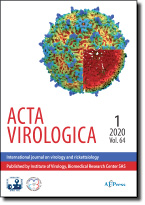Acta Virologica Vol.60, No.3, p.298-306, 2016
|
| Title: Diet-induced obesity reduces the production of influenza vaccine-induced antibodies via impaired macrophage function |
| Author: W.-J. CHO, D.-K. LEE, S.-Y. LEE, S.-H. SOHN, H.-L. PARK, Y.-W. PARK, H. KIM, J.-H. NAM |
|
Abstract: Obesity is a metabolic disease characterized by low-level chronic inflammation. Obese individuals are susceptible to infection by viruses, and vaccination against these pathogens is less effective than in nonobese individuals. Here, we sought to explore the immunological environment in a mouse model of obesity induced by a high-fat diet (HFD). HFD treatment increased the body weight and epididymal fat mass. The proportion of activated B cells, T cells, and macrophages was similar between mice in the HFD group and the regular-fat diet (RFD) group. The Th1 cell subpopulation in the HFD group was increased, whereas the proportion of Treg cells was reduced compared with the RFD group. Moreover, T-cell proliferation and cytokine production did not differ between the groups when cells were stimulated with anti-CD3 and anti-CD28 antibodies in vitro. In macrophages, phagocytic activity was higher in mice fed an HFD than in those fed an RFD, but expression levels of CD86 and MHC class II antigens were similar. When macrophages were cultured in vitro, the proportion of CD86-expressing macrophages was lower in those isolated from mice in the HFD group than in those isolated from the RFD group. Furthermore, lipopolysaccharide-induced interleukin 6 (IL-6) and tumor necrosis factor alpha secretions were significantly reduced in macrophages isolated from the HFD group. In addition, influenza vaccine-induced antibodies in the HFD group diminished more rapidly than in the RFD group. These results suggest that poor functionality of macrophages during obesity might contribute to a reduction in vaccine efficacy.
|
|
| Keywords: high-fat diet; macrophage; obesity; vaccine efficacy |
|
|
Published online: 13-Sep-2016
|
| Year: 2016, Volume: 60, Issue: 3 |
Page From: 298, Page To: 306 |
doi:10.4149/av_2016_03_298
|
|
 download file download file |
|
|
|
|
 download file
download file
